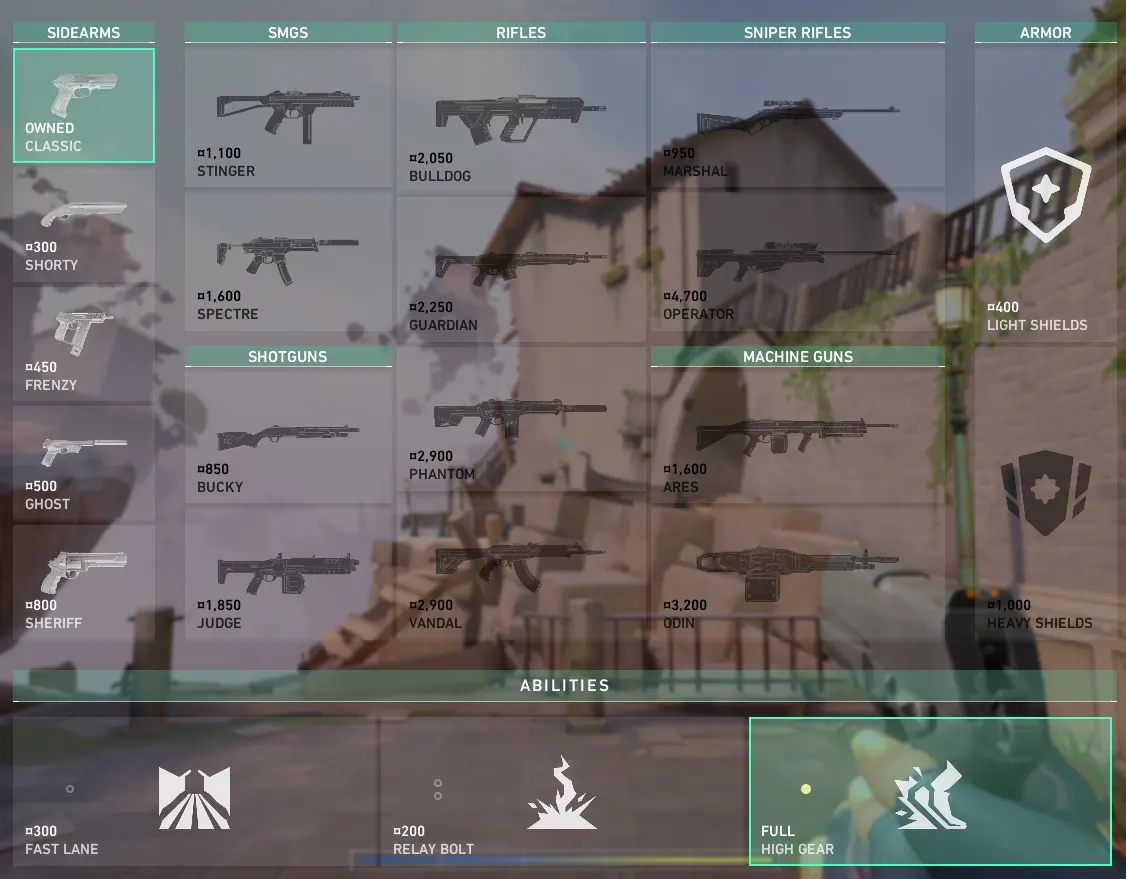
Valorant, a multiplayer shooter developed by Riot Games, demands players to not only showcase shooting skills but also exhibit the ability to manage in-game economy effectively. Tactical gameplay is just one of the many aspects accompanying players on their journey in the game. Efficient resource distribution and money management in each round can significantly impact the outcome of the match. In this guide, we will explore key aspects of the economy in Valorant and provide tips for optimizing finances in various scenarios.
What is the Economy in Valorant?
The economy in Valorant is a concept related to the management of in-game resources, such as credits, which players use to purchase weapons, armour, character abilities, and other items. Effective management of the game's economy is a crucial tactical aspect in Valorant and can substantially influence the outcome of rounds and, consequently, the overall match result.
How to earn credits in Valorant
In Valorant, credits serve as an in-game currency that players can use to buy weapons, armour, character abilities, and other items. Here are several actions that reward players with credits in Valorant:
- The most profitable yet challenging way is to win a round, which awards 3000 credits. If you survive until the end, you receive an additional 1000 credits.
- In the case of defeat, the game rewards you with a less attractive sum of 1900 credits. However, to avoid creating significant economic disparities between teams, subsequent losses increase your credit amount to 2400, and after three or more rounds, it reaches 2900.
- Killing opponents, a crucial aspect of the game, grants you 200 credits for each kill, and this amount remains constant regardless of the player's statistics.
- Planting the Spike (bomb) when playing as the attacking side rewards you with 300 credits.
It is essential to remember these numbers, as the entire game economy revolves around them, allowing you to influence match outcomes by providing your team with the necessary equipment.

How to spend credits in Valorant
The game features an extensive arsenal of weapons, ranging from pistols to machine guns and sniper rifles, which you will use throughout the match. Additionally, important items such as armour and agent abilities have a significant impact on the round's outcome.

What are Full Buy, First Buy, and Economic Rounds?
Now that you know what to spend credits on, it is equally important to know when to do it. In this section, we will discuss the importance of concepts such as "Full Buy," "Economic Round" and "First Buy".
“Full Buy” is a round in which the team decides to invest fully in weapons, armour, and character abilities, using the maximum amount of money. These rounds usually follow a victorious battle when the team has won and earned enough money for a complete purchase.
Key elements of a full buy include acquiring Vandal, Phantom, Bulldog, or Guardian, heavy armour, and a full set of abilities. This type of purchase provides the team with the best weapons and complete protection, making them more competitive in the round.
A full buy aims to maximize the team's resources to increase the chances of winning the round. This is especially crucial after losing the previous round, as a successful full buy can help the team balance the score and get back into the game.
The decision on when to conduct a full buy depends on the team's strategy, the current state of the match, and its financial position. Some teams may choose full buys in critical moments to maximize their potential and shift the game in their favour.

"Economic round" is a round in which a team decides to save money and not invest in expensive weapons and equipment. Economic rounds typically follow a loss in the previous battle when the team doesn't have enough funds for a full purchase.
In economic rounds, players usually opt for cheaper weapons such as sidearms, SMGs, and shotguns, limiting the use of additional funds on armour (acquiring light armour) and character abilities. The goal of this approach may be to accumulate money for a stronger purchase in the future.
Economic rounds represent a balance between economic advantage and chances of winning the round. Teams can employ various tactics to increase their chances, such as forced attacks on specific map points or strategies based on character abilities.
Successful execution of the described methods can lead to the team's financial recovery and provide an opportunity to get back into the game in the following rounds. Meanwhile, a loss in an economic round can complicate the team's financial situation and create an advantage for the opponent in subsequent battles.
"First buy" in Valorant denotes the initial weapon and equipment purchase that players make at the beginning of a match. This term is often used in the context of the game's economy.

At the start of each match, agents begin with a basic set of weapons and have a limited amount of money. The first buy occurs when players decide to spend their funds on more powerful weapons than what they initially had.
The choice of weapons in the first round can significantly impact the course of the match. Players may decide to buy sidearms, SMGs, shotguns, depending on their preferences and the team's tactical plan. However, they must also consider their budget constraints and the capabilities of their opponents.
First buy is a strategic decision that can affect the balance of power in the round. Successful execution of the first purchase can give the team an advantage, while failure can lead to difficulties in subsequent rounds. Therefore, players typically consider their initial purchases based on the team's tactics and the current state of the match.
"Save round" in Valorant signifies a round in which players decide to save their credits and not conduct a full purchase of weapons and equipment. This decision is usually made when the team has limited resources after losing the previous round.
During a save round, players may choose to use cheaper weapons or even pistols, as well as limit spending on armour and character abilities. The main goal is to save credits for a more successful full purchase in the upcoming battles.
Save rounds are typically conducted to prepare for future economic rounds and prevent the team from losing additional credits. It's important to tactically use the remaining resources to maximize the chances of success in the future.
When to buy Light Armour
In Valorant, purchasing light armour can be a strategic decision depending on the specific situation. Light armour costs less than full armour and provides some protection against damage. Its impact in the current patch is significant enough to warrant a dedicated section in our Valorant economic guide. The decision of when to buy light armour depends on several factors:
Team's economic situation:
- If your team has limited resources and cannot afford full armour, light armour can be a good compromise to enhance survivability.
Outcome of the previous round:
- If your team lost the previous round and has limited credits, buying light armour can increase your chances of survival in the next round.
Plan for the economic round:
- In an economic round where the team has a limited budget, players may choose light armour instead of full armour to save credits for more crucial items such as weapons.
Gameplay tactics:
- In certain situations, especially when executing aggressive tactics or playing defensively, light armour may be a preferable choice for quick movement and better manoeuvrability.
Personal preferences and playstyle:
- Some players prefer light armour to save most of their credits for weapons and abilities. This can be particularly useful if players feel confident in their game and prioritize manoeuvrability.
In general, the decision to buy light armour depends on the context of the match and your team's strategy. It's important to make tactical decisions based on the current situation and the team's resources.
READ MORE: All Ranks in Valorant


Econ Rating in Valorant
Econ Rating in Valorant is a metric that shows how much damage you inflict for every 1000 credits spent on purchasing items and weapons. It is calculated using the formula: Econ Rating = Damage / (Credits * 1000). For example, if you inflict 1000 damage spending 5000 credits, your Econ Rating is 2.
A high Econ Rating means you are efficiently using your money, dealing a lot of damage without spending too many credits. The average rating falls between 55-75, indicating sufficient damage. The best rating is 100 and above, signifying that you deal a significant amount of damage without excessive credit expenditure.
Econ Rating is an important metric that can help improve your gameplay skills. If you want to become a more effective player, you should monitor it and strive to enhance it.
Here are some tips to increase your Econ Rating:
- Save money when possible. Don't buy weapons and items if you're not confident about winning the round.
- Be smart in choosing weapons and items. Select weapons that suit your playstyle and that you can use effectively.
- Don't forget about your abilities. Use your agent's abilities to deal damage to opponents and help your team win the round.
Following these tips will help increase your Econ Rating and make you a more efficient player in Valorant.
Conclusion
Thanks to this guide, you've learned all about the economy in Valorant and its importance, familiarized yourself with its key elements. A balanced combination of tactics and credit management will be your guide to victories in this thrilling world of Valorant.
Comments
Upcoming Top Matches
Latest top articles







No comments yet! Be the first one to react